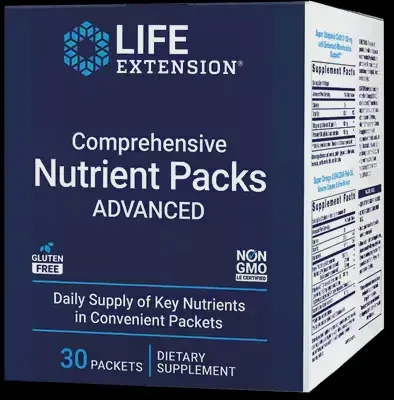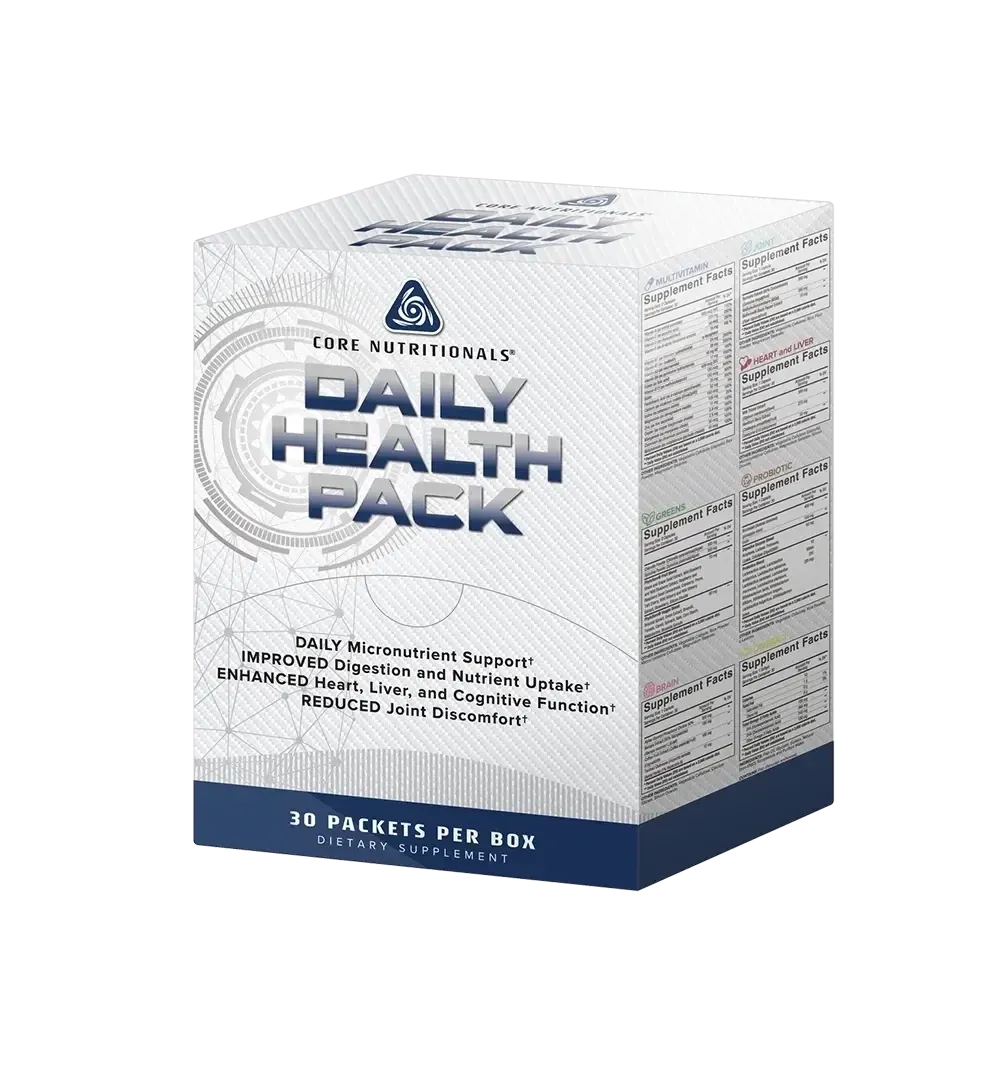🚚 Free Shipping on Orders $49+
Core Nutritionals Daily Health Pack
$64.99
Sold out
List Price: $69.99 Save 7%
Full-body daily pack for digestion, joints & energy
Size
Sold out
Save to Favorites
Customer reviews
Reviews only from verified customers
No reviews yet — buy it and be the first to share your feedback.
Core Nutritionals Daily Health Pack
Product Details
Brand: Core Nutritionals
Form: Packet
Goal: Daily Wellness Support
Serving Size: 1 Packet
Servings Per Container: 30
UPC: 850051031320
- DAILY Micronutrient Support
- IMPROVED Digestion and Nutrient Uptake
- ENHANCED Heart, Liver, and Cognitive Function
- REDUCED Joint Discomfort
We understand that being consistent with taking all your supplements can be tough, especially when your lifestyle is busy and schedule is full. At Core Nutritional’s®, we recognize this and put together a convenient daily packet that has everything you need to support your Crush It® lifestyle inside and outside of the gym. We’ve packed a combination of micronutrients, omega-3, probiotics, greens and reds, and products to support vital joints and organs, that can be highly beneficial to their overall function. Overall, a convenient daily pack of these supplements can help individuals maintain their health, support key body functions, and optimize well-being, even during a hectic and unpredictable lifestyle.
DAILY HEALTHY PACK KEY INGREDIENTS:
B Vitamins (Thiamine, Riboflavin, Niacin, B6 [Pyridoxine], Folic Acid, B12, Biotin, and Pantothenic acid)
B vitamins are a group of eight essential vitamins with several critical functions in the body. Though both molecularly and physiologically distinct, they are also deeply interrelated in their effects, synthesis, and metabolism. Among the B-complex’s many critical roles are energy (protein, carbohydrates, and fat) metabolism, supporting and maintaining the healthy function of the adrenal glands, skeletal muscle function, and digestion.
While rates of metabolism and clearance differ between each B vitamin, all B vitamins are water-soluble and are thus not stored in fat. As a result, the body simply excretes excess B vitamins in the urine and requires replenishment (from food or supplements) to maintain the cell functions to which B vitamins contribute.
Vitamin A (as retinyl palmitate)
Beta carotene is itself not an essential vitamin but is rather the precursor to the fat-soluble and essential vitamin, vitamin A (Retinol). Like B vitamins, the term vitamin A refers to the compound class retinoids, comprised of retinol, retinal (also called retinaldehyde), retinoic acid, and provitamin A compounds such as beta carotene.
As their names suggest, retinoids are critical to the function of human eyes and therefore to the maintenance of circadian rhythms (our “biological clock”). Vitamin A combines with proteins in the eye to form light-sensing cells that both facilitate vision and regulate our sleep-wake cycles.
Beyond its role in sight, vitamin A is also essential for cellular growth and differentiation and the immune system.
Vitamin C (as Ascorbic Acid)
Vitamin C is perhaps historically best-known for the treatment and prevention of scurvy, though it has many other roles in the body. For example, vitamin C catalyzes or is a cofactor in eight enzymatic reactions involved in the synthesis of collagen, the nutrient carnitine, and several neurotransmitters necessary for the proper function of the brain.
In the contemporary context, vitamin C is best known as a potent antioxidant. In addition to its intrinsic activity as an antioxidant, vitamin C has been shown in in vitro trials to regenerate alpha-tocopherol (vitamin E). As an antioxidant, vitamin C combats the detrimental effects of a group of compounds called radical oxygen species that, when produced, degrade the lipid membrane of the cell, and may cause internal damage. By “scavenging” these free radicals, vitamin C and other antioxidants form a defense against excess cellular damage.
Vitamin D3 (as Cholecalciferol)
Vitamin D, in its various forms, is not an essential nutrient – as it is produced endogenously within the body, as a reaction to the skin’s exposure to the sun – and thus not commonly considered a vitamin. Despite its technical classification, vitamin D (a hormone), is nevertheless an import and biologically-active compound, necessary for the calcium homeostasis and metabolism, along with increasing the absorption of magnesium and phosphate.
Vitamin E (as dl-alpha tocopherol acetate)
Vitamin E is another technical misnomer, as the term refers to a group of compounds known as tocopherols with eight biologically-active constituents: alpha-, beta-, gamma-, and delta-tocopherol and alpha-, beta-, gamma-, and delta-tocotrienol. Alpha-tocopherol is the principal bioactive in humans, though the presence of other tocopherols has been linked to beneficial effects.
As a result of its robust antioxidant activity, vitamin E assists in the maintenance and support of several physiological processes, though most notably sight and the immune system. Emerging research also suggests that the alpha-tocopherol form of vitamin E inhibits an enzyme known as protein kinase C, and therefore contributes to the healthy regulation of smooth muscle cell growth and differentiation.
Calcium (as dicalcium malate (DimaCal®)
While best-known as the main bioactive in milk, and a compound that contributes to strong bones, calcium has numerous physiological effects in the body – including mediating vascular contraction and vasodilatation, muscle function, nerve transmission, intracellular signaling, and hormonal secretion. Homeostatic regulation of calcium, which the body cannot produce, requires sufficient levels of vitamin D.
When present in sufficient amounts, calcium is necessary for the adequate formation, function, and remodeling of both bone and teeth. Insufficient levels of calcium are associated with degenerative bone and joint disorders such as osteoporosis, wherein bone accretion slows or stops; thereby reducing bone mass and density and decreasing bone strength.
Iodine (as potassium iodide)
Iodine is a trace element naturally present in certain foods, including kelp. Iodine is a critical component for fetal development, especially during early pregnancy, as maternal T4 (thyroxine) is the sole source of fetal thyroid hormone. After birth, especially if breast-feeding, iodine remains an important constituent of a balanced-diet to maintain adequate T3 (triiodothyronine) and T4 (thyroxine) levels in the mother and for the proper cognitive development in the child.
As implied, however, the most important of iodine’s functions is assisting the body to produce and maintain healthy levels of both thyroid hormones and TSH (thyroid stimulating hormone, released by the pituitary). The thyroid hormones, in turn, regulate several critical biochemical reactions, including protein synthesis, and, along with norepinephrine/epinephrine, largely determine the body’s metabolic rate.
Magnesium (as Di-Magnesium Malate)
It is difficult to overstate the biological necessity of magnesium. Magnesium is a co-factor in over 300 enzymatic reactions that regulate essential physiological functions such as protein synthesis, glucose homeostasis, muscle and nerve function, and the maintenance and support of healthy blood pressure levels.
Magnesium is also required for the use of the body’s energy currency, ATP. To become biologically active, ATP must be bound to magnesium to form Mg-ATP. In addition, magnesium is necessary for the proper function of cells with calcium and potassium gated ion channels such as heart and muscle cells.
In men, magnesium (along with zinc) is necessary for the maintenance of healthy levels of testosterone.
Zinc (as Zinc Aspartate)
As an essential mineral, like magnesium, zinc is also involved in a wide-range of essential biological functions in the human body – and a requirement in the catalytic activity of over 100 enzymes.
Most notably, zinc is vital for immune function, protein synthesis, cellular division, and DNA synthesis. For immune function, zinc is required for the function of a group of immune cells known as neutrophils and macrophages, which eliminate pathological cells and their products from the body.
With magnesium, sufficient levels of zinc are also necessary for the production and maintenance of healthy levels of testosterone.
Copper (as Copper Bisglycinate Chelate)
Copper is a trace element necessary for the production, function, and maintenance of a diverse range of compounds involved in physiological function.
The brain, the heart, bone, and connective tissue specifically require copper or the enzymes it catalyzes to properly grow and differentiate their various cell types. Like many of the ingredients in Core MULTI, copper is also required for the homeostasis of other minerals, specifically zinc.
Manganese (as Manganese Citrate)
Manganese is a required element for not only humans, but all living organisms. Manganese primarily acts as an antioxidant, specifically scavenging a radical oxygen species known as superoxide.
Chromium (as Chromium Picolinate)
Chromium is an essential, though little understood, trace element found in certain foods and industrial compounds. Only one of chromium’s two forms, the form used in Core MULTI, chromium 3+, is biologically active.
While not as well-defined as other trace elements, chromium’s physiological actions nevertheless seem pivotal to the production and transmission of healthy levels of insulin. Emerging research also seems to suggest that chromium is directly involved in the metabolism of carbohydrates.
Molybdenum (as Molybdenum Glycinate Chelate)
Molybdenum is an essential trace element, involved in at least four enzymatic reactions necessary for urea excretion and several other physiological functions.
Daily Health Pack Directions:
Take 1 packet with water once a day. For best results, consume with a meal.
You May Also Like
Top 10 Pick

Life Extension Comprehensive Nutrient Packs Advanced
Life Extension Comprehensive Nutrient Packs Advanced
Daily packets with fish oil, CoQ10, turmeric & more
$67.50
Everyday Low Price

Universal Animal Pak Powder
Universal Animal Pak Powder
All-In-One Training Formula with 85+ Nutrients
List Price: $52.45
Save 5%
$49.99
Top 10 Pick

Universal Animal Pak 44 Packs
Universal Animal Pak 44 Packs
Full-spectrum multivitamin for serious lifters
5.0
$39.95
Powered by Lightspeed
Display prices in:USD

